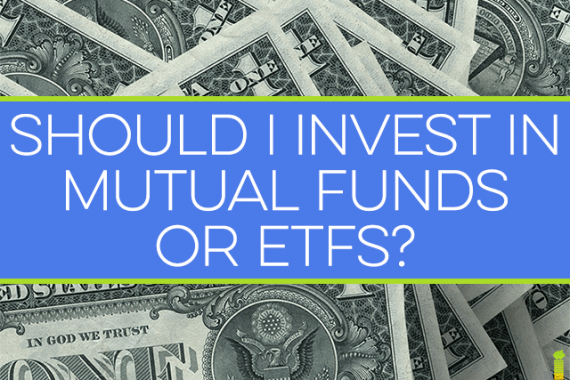“Should I invest in mutual funds or ETFs?” I heard this question on a daily basis during my stock broker days from investors wanting to know which option they should choose. Often considered stalwarts in a portfolio, mutual funds have seen their popularity take a hit in recent years to their generally lower-cost cousins – the ETF or Exchange Traded Fund.
Before I discuss whether you should invest in mutual funds or ETFs, allow me to take a step back. Investing in the stock market can be difficult, especially for those just starting or who are just starting to learn how to invest. Investing doesn’t have to be that difficult – in fact I believe it can be rather simple once you know your goals and how best to accomplish them. Both mutual funds and ETFs can be great tools to help meet those goals, but it will depend on your specific situation which option you should choose. This post is not meant to be exhaustive, rather provide a high-level overview of mutual funds vs. ETFs and how to choose the best one for you.
Table of Contents
Should I Invest in Mutual Funds or ETFs?
Simply speaking, a mutual fund or an ETF are what we refer to as a basket of securities. Think of it as being able to buy one thing that has many parts as opposed to buying 20 individual stocks. There are thousands of investment options available if you’re looking to invest in the stock market and either of these vehicles can make investing simpler to manage.
This can possibly take some of the fuss out of investing in the stock market as you can invest in a handful of mutual funds or ETFs as opposed to a myriad of stocks and bonds. If you have a 401(k), then you likely already have access to either mutual funds or ETFs depending on the plan. Your 401(k) plan will likely have resources available to help you choose which funds are best for you, but will only cover the funds in the plan.
Are They Completely Opposite?
We’ve already established that mutual funds and ETFs are baskets of securities. For our purposes, right now, that is where the majority of the similarities end. When deciding between a mutual fund and an exchange traded fund there are three, generally speaking, major differences. Those three differences are:
- Fees
- How they trade
- Minimum investments
Because many ETFs track an index like the S&P 500 or the Dow, the fees are generally much lower as they may not be actively managed. Mutual funds, however, are generally more actively-managed and therefore have higher fees associated with them. These fees can erode returns over time making it a possible detractor.
The next major difference affects how they trade. Mutual funds trade only once at the end of the trading day and the price is generally made public around 5:00 p.m. EST. ETFs however trade like a stock and trade throughout the day, meaning the price fluctuates intra-day as opposed to having to wait until the end of the day.
The final major difference is in relation to how much you need to invest in either investment vehicle. If you’re looking to invest in mutual funds, many have a minimum amount you need to start with. This can be as little as $500 or $1,000 and can go up from there. In addition, mutual funds often must be purchased through the given fund family. The nice thing about ETFs is that since they trade on the stock market there is no minimum to start investing in them; you simply buy the number of shares you can afford. Since they trade like a stock, ETFs can be purchased through almost any brokerage.
Additionally, ETFs are generally more tax-efficient in how they handle sales. As a ETF holder only experiences a tax event, generally speaking, when they sell a holding that makes them more tax efficient. Mutual funds, on the other hand, make distributions at year-end as well and sell holdings to cover shareholder redemptions – both causing a taxable event. If taxes are important to you in investing, this must be taken into consideration when looking at ETFs vs. mutual funds.
Make Sure to Look Under the Hood
Is your head swimming yet? 🙂 Now that you’ve established that you want to invest in either mutual funds or ETFs you need to do your homework to see what suits you best. This is where I will almost always reference my go-to source for mutual funds and ETFs – Morningstar.
Morningstar is THE source to go to when you’re considering either of these options. Morningstar breaks down exactly how much it’ll cost you to invest in the given fund, which is important to an investor like me who is trying to be frugal and keep my costs down.
My favorite section on Morningstar shows the Top 25 holdings of mutual funds and ETFs. The reason why this is vital is that it tells you what they hold in the fund. Don’t just go off the name of the fund to guide you to what you should invest in.
For example, if you want to focus on socially responsible investing, then you’ll want to look at the stocks within the fund to make sure none of them conflict with what you want to avoid. The moral is, as with any investment choice, do your homework before you decide which specific mutual fund or ETF you invest in.
What’s Your End Goal?
I’ve written about determining what you’re investing in before as well as setting a risk profile and investing in mutual funds vs. ETFs is no different. Investing in the stock market is best served when you have a long-term approach as opposed to making rash and emotional decisions. With that in mind, investing in an index fund will suit most investors.
As opposed to a fund that picks specific stocks or bonds based off their given ideals, an index fund seeks to mimic the movements of a specific index (think the S&P 500 or Nasdaq) and thus has lower fees and generally outperforms actively managed mutual funds over the long- term. Most times, but not always, an index fund will be in the form of an ETF and will enjoy lower fees and thus less erosion, in general, over the life of the investment.
To make things better for you as the investor, many online brokerages offer a selection of ETFs that you can buy commission-free which is generally not something found with many mutual funds. Some of those brokerages are:
- TD Ameritrade – who has over 100 commission-free ETFs
- Vanguard – who has over 60 commission-free ETFs
Another option to consider if you want to invest in a mutual fund or ETF is Betterment. Betterment lets you start investing with no minimum balance requirement and focuses on low-cost ETFs so more of your money works for you.
Like I said previously, when you’re making your investment decisions make sure to do your homework before you invest in the stock market.
What’s your take on mutual funds? Do you invest in them or do you look for less actively-managed index funds?
Additional resource: If you’re looking to invest in either mutual funds or ETFs, check out my favorite tool – Personal Capital. Completely free, it allows you to compare funds against their benchmarks, monitor investment accounts, reviews your portfolio and watch your net worth grow plus many other tools – all at no expense to you.
Open your free Personal Capital account today!
I’m John Schmoll, a former stockbroker, MBA-grad, published finance writer, and founder of Frugal Rules.
As a veteran of the financial services industry, I’ve worked as a mutual fund administrator, banker, and stockbroker and was Series 7 and 63-licensed, but I left all that behind in 2012 to help people learn how to manage their money.
My goal is to help you gain the knowledge you need to become financially independent with personally-tested financial tools and money-saving solutions.





